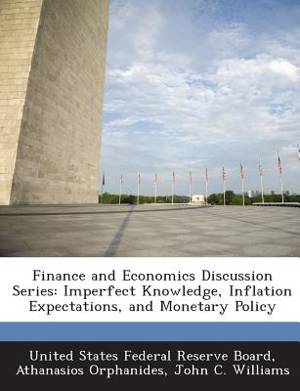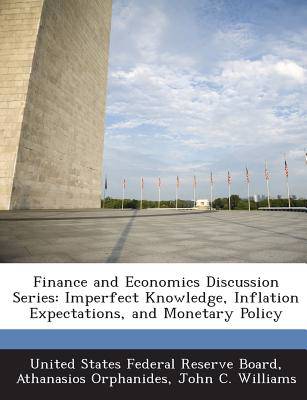
- Afhalen na 1 uur in een winkel met voorraad
- Gratis thuislevering in België vanaf € 30
- Ruim aanbod met 7 miljoen producten
- Afhalen na 1 uur in een winkel met voorraad
- Gratis thuislevering in België vanaf € 30
- Ruim aanbod met 7 miljoen producten
Zoeken
Finance and Economics Discussion Series
Imperfect Knowledge, Inflation Expectations, and Monetary Policy
Athanasios Orphanides, John C Williams
Paperback | Engels
€ 21,45
+ 42 punten
Uitvoering
Omschrijving
This paper investigates the role of imperfect knowledge regarding the structure of the economy on the formation of expectations, macroeconomic dynamics, and the efficient formulation of monetary policy. Economic agents rely on an adaptive learning technology to form expectations and continuously update their beliefs regarding the dynamic structure of the economy based on incoming data. The process of perpetual learning introduces an additional layer of dynamic interactions between monetary policy and economic outcomes. We find that policies that would be efficient under rational expectations can perform poorly when knowledge is imperfect. In particular, policies that fail to maintain tight control over inflation are prone to episodes in which the public's expectations of inflation becomes uncoupled from the policy objective and stagflation results, in a pattern similar to that experienced in the United States during the 1970s. More generally, we show that in the presence of imperfect knowledge, policy should respond more aggressively to inflation than under perfect knowledge.
Specificaties
Betrokkenen
- Auteur(s):
- Uitgeverij:
Inhoud
- Aantal bladzijden:
- 38
- Taal:
- Engels
Eigenschappen
- Productcode (EAN):
- 9781288715725
- Verschijningsdatum:
- 6/02/2013
- Uitvoering:
- Paperback
- Formaat:
- Trade paperback (VS)
- Afmetingen:
- 189 mm x 246 mm
- Gewicht:
- 86 g

Alleen bij Standaard Boekhandel
+ 42 punten op je klantenkaart van Standaard Boekhandel
Beoordelingen
We publiceren alleen reviews die voldoen aan de voorwaarden voor reviews. Bekijk onze voorwaarden voor reviews.








